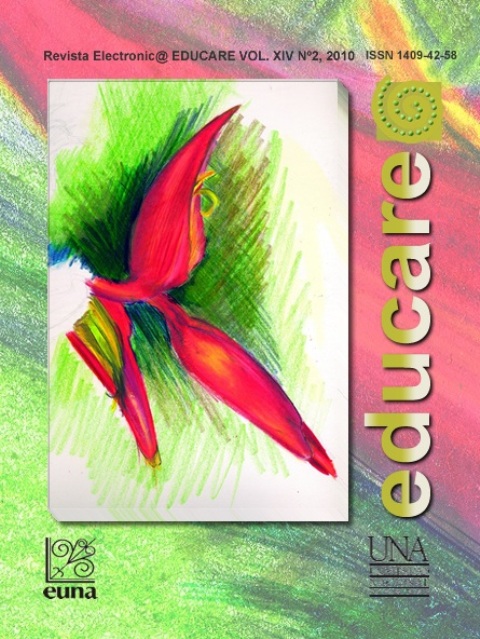Communication in the Seventh Grade Classroom
DOI:
https://doi.org/10.15359/ree.14-2.15Keywords:
educational communication, learning styles, classroom interaction, seventh year secondary education, teacher profileAbstract
Reflections on communication in the learning process at the level of the seventh year of secondary education based on the methodological and pedagogical approaches, considered in research of a multidisciplinary team of the CIDE of UNA (National University), with the aim of building the “teaching performance profile for the seventh year of Costa Rican education”.
It demonstrates the role of teachers to ensure favorable communication links to the learning process, not only to capture the attention and interest of students through varied and systematic motivations, but also by the honesty, openness, personal example and involvement in the task, problems and aspirations of students.
References
Alfaro, M., Brenes, A., Gamboa, A., Jiménez, S., Martín, J., Ramírez, A., Vargas, M. & Zúñiga, A.
(2008). Construcción del perfil de desempeño docente para el sétimo año de la educación
pública (Informe final de investigación del Proyecto Perfiles, Dinámicas y Desafíos de la
Educación Costarricense, tercera etapa). Heredia: CIDE, Universidad Nacional.
Artavia, J. (2005). Interacciones personales entre docentes y estudiantes en el proceso de ense-
ñanza y aprendizaje. Un estudio de caso. Actualidades Investigativas en Educación, 5(2),
-19. Recuperado de http://revista.inie.ucr.ac.cr/articulos/2-2005/archivos/interacciones.pdf
Sainz, L. (1998). La comunicación en el proceso pedagógico: algunas reflexiones valorativas.
Revista Cubana de Educación Médica Superior, 12(1), 26-34. Recuperado de http://www.
bvs.sld.cu/revistas/ems/vol12_1_98/ems04198.htm
Downloads
Published
How to Cite
Issue
Section
License
1. In case the submitted paper is accepted for publication, the author(s) FREELY, COSTLESS, EXCLUSIVELY AND FOR AN INDEFINITE TERM transfer copyrights and patrimonial rights to Universidad Nacional (UNA, Costa Rica). For more details check the Originality Statement and Copyright Transfer Agreement
2. REUTILIZATION RIGHTS: UNA authorizes authors to use, for any purpose (among them selfarchiving or autoarchiving) and to publish in the Internet in any electronic site, the paper´'s final version, both approved and published (post print), as long as it is done with a non commercial purpose, does not generate derivates without previous consentment and recognizes both publisher's name and authorship.
3. The submission and possible publication of the paper in the Educare Electronic Journal is ruled by the Journal’s editorial policies, the institutional rules of Universidad Nacional and the laws of the Republic of Costa Rica. Additionally, any possible difference of opinion or future dispute shall be settled in accordance with the mechanisms of Alternative Dispute Resolution and the Costa Rican Jurisdiction.
4. In all cases, it is understood that the opinions issued are those of the authors and do not necessarily reflect the position and opinion of Educare, CIDE or Universidad Nacional, Costa Rica. It is also understood that, in the exercise of academic freedom, the authors have carried out a rogorous scientific-academic process of research, reflection and argumentation thar lays within the thematic scope of interest of the Journal.
5. The papers published by Educare Electronic Journal use a Creative Commons License:















 The articles published by Educare Electronic Journal can be shared with a Creative Commons License:
The articles published by Educare Electronic Journal can be shared with a Creative Commons License: 



